The following is a list of recipients of the various awards, prizes, and honors presented during the 126th annual meeting of the American Historical Association on Friday, January 6, 2012, in the Sheraton Chicago Hotel & Towers, Chicago Ballroom VI.
Theodore Roosevelt–Woodrow Wilson Award
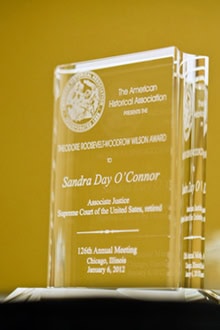
Theodore Roosevelt-Woodrow Wilson Public Service Award
Sandra Day O’Connor (associate justice, Supreme Court of the United States, retired). The Roosevelt-Wilson Award is given by the Council of the American Historical Association to honor a public figure or other civil servant who has made extraordinary contributions to the study, teaching, and public understanding of history. . In a variety of roles over a long career, Justice O’Connor has championed the cause of a historically aware citizenry as fundamental to the functioning of American democracy. Justice O’Connor is one of those leaders whose work helps to foster and maintain the very conditions under which future generations are able to learn from the past.
Since her retirement in 2006 Justice O’Connor has tirelessly promoted public understanding and teaching of history through civics (and civics through history), especially at the secondary school level. She has consistently placed historical knowledge and understanding at the center of civic competency, and argued that the ability of citizens to guide their society thoughtfully into the future depends on actively educating people about their history. In a major effort to live by these ideals, Justice O’Connor took on the unexpected role of digital innovator: she inspired the creation and maintenance of iCivics.org, a sophisticated web site for children to learn about U.S. government and history through online games.
Justice O’Connor has been active in the Campaign for the Civic Mission of Schools, a valuable ally of the history education community in our continuing quest for support of professional development for our precollegiate teachers. Good civics requires historical context, and Justice O’Connor has been a crusader for good civics. Just as her jurisprudence evinced a significant recognition of the importance of context, she has championed the cause of rigorous, universal civics curriculum that complements and builds on history education, rather than replaces it.
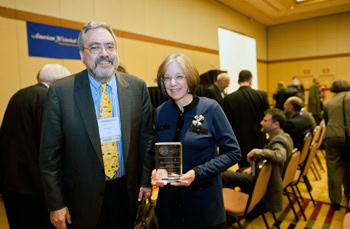
AHA President Anthony Grafton with Judge Diane P. Wood.
While civics subject areas are not coterminous with the discipline of history, O’Connor’s work on behalf of the reproduction of civic values has highlighted the necessity of history in democracy. She has reinforced an appreciation of history and its importance to our civil society. Her efforts underscore that historical knowledge and understanding are fundamental components of social engagement. O’Connor has dedicated her time to educating children for civic competency, and has argued that everyone needs to have a strong history education for the public good.
Sandra Day O’Connor has also demonstrated her commitment to history through her work with numerous institutions, including the Gilder Lehrman Institute of American History, the National Park Service, America’s 400th Anniversary, and the National Constitution Center. Her interaction with historical institutions began in her hometown of Phoenix, Arizona—well before her appointment to the Supreme Court— with the kind of local history orientation that is central to historical consciousness among millions of Americans but is often missing from the experience of public figures.
Recognizing that one of the key functions of history in American public life is to reproduce civic values, Sandra Day O’Connor is being presented with the Roosevelt-Wilson Award for reminding us that history should be a living legacy and an ongoing responsibility for all citizens.
2011 Book Awards and Prizes
Herbert Baxter Adams Prize
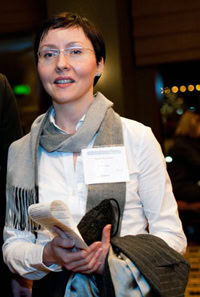
Anna Krylova
Named for one of the Association’s founding members and its first secretary, this prize was established in 1903 for works in the history of the Eastern Hemisphere. It is offered annually for an author’s first substantial book, with a chronological coverage alternating between the early European period one year and the modern period the next. This evening it is being awarded for the modern period from 1815. Prize committee members are George Behlmer, University of Washington, chair; Clare H. Crowston, University of Illinois at Urbana-Champaign; Laura L. Frader, Northeastern University; A. Katie Harris, University of California, Davis; and Hugh Thomas, University of Miami.
Anna Krylova, Duke University
Soviet Women in Combat: A History of Violence on the Eastern Front (Cambridge University Press)
Professor Krylova’s book asks and answers a vexing question about Soviet women on World War II’s eastern front: How did Stalinist Russia, reputedly a patriarchal society, produce these fierce warriors? Krylova’s subtle analysis, drawing on such varied sources as private letters, diaries, fiction, films, interviews, newspapers, and state archives, enriches our understanding of gender roles in the crucible of epic slaughter. Along the way she tells a captivating story about grace under pressure.
George Louis Beer Prize
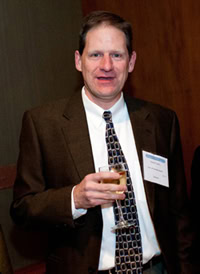
David Ciarlo
Established by a bequest from George Beer, a historian of the British colonial system before 1765, this prize is offered annually in recognition of outstanding historical writing in European international history since 1895. This year, two outstanding works are being honored. Prize committee members are Mary D. Lewis, Harvard University, chair; Michael Adas, Rutgers University-New Brunswick; Herrick Chapman, New York University; Aviel Roshwald, Georgetown University; and Marla Stone, Occidental College.
David Ciarlo, University of Colorado, Boulder
Advertising Empire: Race and Visual Culture in Imperial Germany (Harvard University Press)
A theoretically deft history of the intersection of race, colonialism and commercial culture in Imperial Germany, bringing a novel perspective and startlingly fresh insights to bear on the relationship among international and national marketing trends, consumer identity, and the transnational or trans-Atlantic history of racism in the early twentieth century. Ciarlo’s systematic and imaginative use of sources such as trademark registrations provides a model for writing cultural histories of visual images in the age of mass consumption.
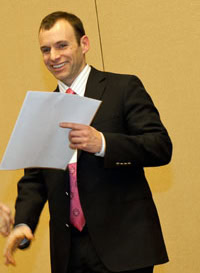
Michael A. Reynolds
Michael A. Reynolds, Princeton University
Shattering Empires: The Clash and Collapse of the Ottoman and Russian Empires, 1908–1918 (Cambridge University Press)
With exceptional agility, Michael Reynolds weaves together a deeply researched investigation of political turmoil in the Transcaucasus and eastern Anatolian region with a fresh analysis of Ottoman-Russian relations in the era of the First World War. The result is a stunning account of how efforts to save the Ottoman and Russian empires transformed and devastated this multiethnic borderland. Reynolds makes a powerful case for overturning assumptions about the rise of nationalism and the disintegration of empires.
Albert J. Beveridge Award
This award was established in memory of Senator Beveridge of Indiana through a gift from his wife and donations from AHA members from his home state. It is awarded annually for the best English-language book on American history (United States, Canada, or Latin America) from 1492 to the present.
Prize committee members are Eric Hinderaker, University of Utah, chair; Paula Alonso, George Washington University; Amy Greenberg, Penn State University; David Greenberg, Rutgers University-New Brunswick; and Manisha Sinha, University of Massachusetts at Amherst.
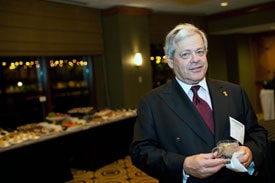
Daniel Okrent
Daniel Okrent
Last Call: The Rise and Fall of Prohibition (Scribner)
Last Call is an engrossing account of the political, economic, social, and cultural dimensions of prohibition. It details both the evasions of alcohol producers, traders, and consumers, and the failings of the enforcement system. It is concise, revelatory, and often astonishing. Sweeping in scope, deft and subtle in analysis, and judicious in tone, Last Call provides an object lesson in the way grassroots social movements can transform the landscape of American politics.
James Henry Breasted Prize
Established in 1985 by Joseph O. Losos, this prize is named in honor of James Henry Breasted, a pioneer in ancient Egyptian and Near Eastern history and president of the Association in 1928. It is offered annually for the best book in English in any field of history prior to C.E.1000. Committee members are Patrick Geary, University of California at Los Angeles, chair; Bonnie Effros, University of Florida; and Charles King, University of Nebraska-Omaha.
Saskia T. Roselaar, University of Nottingham
Public Land in the Roman Republic: A Social and Economic History of Ager Publicus in Italy, 396–89 B.C., Oxford Studies in Roman Society and Law (Oxford University Press)
In the first fundamental reevaluation in almost a century of the legal, narrative, and epigraphical, and archaeological sources of the land crisis leading to the Gracchan reforms of the second century BCE, Saskia Roselaar demonstrates that the central purpose of privatizing public lands was to increase the number of soldiers. The restoration of small farmers to the land, contrary to received tradition, had significant long-term repercussions on Roman social, economic, and political structures.
John H. Dunning Prize
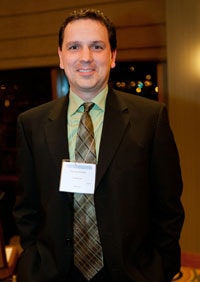
Darren Dochuk
This prize was established by a bequest from Mathilde Dunning in 1927 and is awarded biennially to a recent scholar for an outstanding monograph in manuscript or in print on any subject relating to United States history. Prize committee members are J. William Harris, University of New Hampshire, chair; Gretchen Adams, Texas Tech University; Susan Glenn, University of Washington; Peter Onuf, University of Virginia; and Matthew Pinsker, Dickinson College.
Darren Dochuk,Purdue University
From Bible Belt to Sunbelt: Plain-Folk Religion, Grassroots Politics, and the Rise of Evangelical Conservatism (W. W. Norton)
Darren Dochuk’s compelling book argues that modern American conservatism has its roots in the migration of “plain folk” from the western South to southern California in the 1930s and after. His wide-ranging and deeply researched study shows how these migrants built churches, businesses, and other institutions, forging a worldview that blended Jeffersonian political precepts with evangelical religion. They became the driving force, not just the receptive audience, for the rise of the New Right.
John K. Fairbank Prize in East Asian History
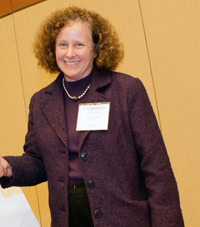
Carol Benedict
Established in 1968 by friends of John K. Fairbank, the prize is an annual award offered for an outstanding book in the history of China proper, Vietnam, Chinese Central Asia, Mongolia, Manchuria, Korea, or Japan since the year 1800. Prize committee members are Daniel Botsman, Yale University; Pamela Crossley, Dartmouth College; Thomas Havens, Northeastern University; and Hyung Gu Lynn, University of British Columbia.
Carol Benedict, Georgetown University
Golden-Silk Smoke: A History of Tobacco in China, 1550–2010 (University of California Press)
With both a thematic coherence and a deftly interwoven chronological progression, Carol Benedict has produced a work that will remain the definitive study of tobacco in China. The engaging, well-illustrated, and superbly documented narrative sweeps from the late imperial period to the present, integrating scholarship on history, economy, medicine, gender, technology, urbanization, and popular culture. At the same time, the book contributes an essential chapter to the evolving story of global commerce.
Morris D. Forkosch Prize
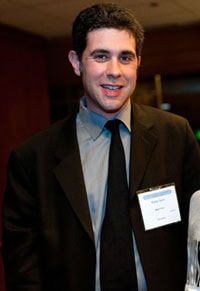
Philip J. Stern
The Association offers the Forkosch Prize annually in recognition of the best book in English in the field of British, British imperial, or British Commonwealth history since 1485. Prize committee members are Ian Christopher Fletcher, Georgia State University, chair; Deborah Cohen, Northwestern University; Amy Froide, University of Maryland, Baltimore County; Dana Rabin, University of Illinois, Urbana-Champaign; and Peter Thorsheim, University of North Carolina, Charlotte.
Philip J. Stern, Duke University
The Company-State: Corporate Sovereignty and the Early Modern Foundation of the British Empire in India (Oxford University Press)
In his sophisticated study of the East India Company in the seventeenth and eighteenth centuries, Philip Stern challenges a long-established account of the chartered company as a trading venture that only belatedly became a territorial power. In exploring the rich history of the company-state’s ideas about sovereignty, practices of government, and struggles over boundaries, he develops original and exciting arguments on empire not only in India but around the early modern world.
Leo Gershoy Award
Established in 1975 by a gift from Ida Gershoy in memory of her late husband, this annual prize is awarded to the author of the most outstanding work in English on any aspect of the field of seventeenth- and eighteenth-century western European history. Prize committee members are Paul Monod, Middlebury College, chair; Jennifer M. Jones, Rutgers University-New Brunswick; Benjamin Schmidt, University of Washington; Helmut Walser Smith, Vanderbilt University; and Ulrike Strasser, University of California at Irvine.
Alexandra Walsham, Trinity College, University of Cambridge
The Reformation of the Landscape: Religion, Identity, and Memory in Early Modern Britain and Ireland (Oxford University Press)
This sweeping study chronicles the relationship between landscape and the sacred in Britain and Ireland from the Reformation to the eighteenth century. Walsham’s lucid prose tells a complex story of transformation, from the medieval veneration of holy places to the Protestant “war against idols,” from the Anglican resacralization of space to the Providential exaltation of nature as “God’s book.” She roots religious history in a sense of place, and grounds environmental history in cultural convictions.
Clarence Haring Prize
This prize is awarded every five years for the best work by a Latin American scholar in Latin American history. Committee members are Brodwyn Fischer, Northwestern University, chair; Donna Guy, Ohio State University; Emilio Kouri, University of Chicago; Francisco Scarano, University of Wisconsin-Madison; and Kevin Terraciano, University of California at Los Angeles.
Walter Fraga Filho, University Federal da Bahia
Encruzilhadas da Liberdade: Histórias de Escravos e Libertos na Bahia, 1870–1910 (Editora Unicamp)
Walter Fraga Filho’s Encruzilhadas da Liberdade incorporates the insights and methodologies of a generation of extremely innovative scholarship on Brazilian abolition through deep research, careful attention to quotidian politics, and brilliant storytelling. Fraga Filho argues that post-abolition social relations grew from the demands, networks, and strategies of abolition, and leaves no doubt that freedom was shaped from the ground up. This is a beautifully rendered history with much to teach scholars of slavery, abolition, and freedom far beyond Brazil.
J. Franklin Jameson Prize
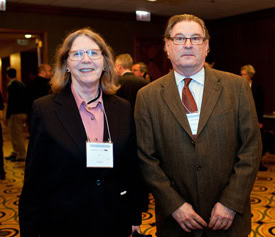
Pamela O. Long and Alan M. Stahl
Established in 1980, this prize is awarded every five years for outstanding achievement in the editing of historical sources. The prize is named in honor of J. Franklin Jameson, a founder of the Association and longtime managing editor of the American Historical Review. Prize committee members are Thomas P. Slaughter, University of Rochester, chair; Mark Lawrence, University of Texas at Austin; Jane Mangan, Davidson College; Ann Moyer, University of Pennsylvania; and June Namias, University of Alaska Anchorage.
Pamela O. Long, independent scholar; David McGee, independent scholar; and Alan M. Stahl, Princeton University
The Book of Michael of Rhodes: A Fifteenth-Century Maritime Manuscript, 3 vols. (MIT Press)
The Rhodes text, now available for the first time in translation, makes an important contribution to European medieval, Venetian, and Italian history and the history of manuscript production, exploration, mathematics, seafaring, and travel, and provides deep access to the man who produced it as well as the world in which he lived. We find the three volumes examples of documentary editing at its very best.
Joan Kelly Memorial Prize in Women’s History
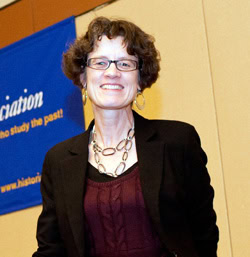
Leslie J. Reagan
The Coordinating Committee on Women in the Historical Profession and the Conference Group on Women’s History (now the Coordinating Council for Women in History) established this annual prize in 1983. The AHA administers the prize. It is offered for the best work in women’s history and/or feminist theory. Prize committee members are Karin A. Rosemblatt, University of Maryland at College Park, chair; June Melby Benowitz, University of South Florida at Sarasota-Manatee; Katherine French, State University of New York at New Paltz; Sheryl Kroen, University of Florida; and Michele Mitchell, New York University.
Leslie J. Reagan, University of Illinois at Urbana-Champaign
Dangerous Pregnancies: Mothers, Disabilities, and Abortion in Modern America (University of California Press)
Leslie Reagan’s bold study shows how state policy and medical practice shaped women’s and men’s decisions to terminate pregnancies after pregnant women’s exposure to rubella, which might have produced children with birth defects. Using an astonishing array of medical, social, legal, visual, and popular sources, Reagan powerfully chronicles the racial and class dimensions of attitudes toward, and access to, abortion while exploring changing understandings of patients’ rights, disability, motherhood, childrearing, fertility, and parenting.
Martin A. Klein Prize in African History
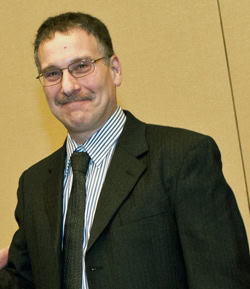
Jonathon Glassman
Awarded for the second time, the Klein Prize recognizes the most distinguished work of scholarship on African history published in English during the previous year. Focusing primarily on continental Africa (including those islands usually treated as countries of Africa), books on any period of African history and from any disciplinary field that incorporates an historical perspective are eligible. The prize committee pays particular attention to methodological innovation, conceptual originality, literary excellence, and reinterpretation of old themes or development of new theoretical perspectives. Prize committee members are Jean Allman, Washington University in St. Louis, chair; Benedict Carton, George Mason University; and Toyin Falola, University of Texas at Austin.
The prize is named for Martin A. Klein, who is currently professor of history at the University of Toronto. Funding for the prize was completed thanks to a substantial donation from Dr. Mougo Nyaggah of California State University at Fullerton and his wife Dr. Lynette Nyaggah. Mougo Nyaggah was Klein’s first graduate student at the University of California Berkeley.
Nyaggah credits the completion of his doctorate to Klein’s mentoring, guidance, enthusiasm, and commitment to the research and teaching of African history. He observed that, “There are many Martins who have or will mentor and inspire many Africanist students in American universities.Those mentors will be honored by this prize for their human and scholarly contribution.”
The prize committee pays particular attention to methodological innovation, conceptual originality, literary excellence, and reinterpretation of old themes or development of new theoretical perspectives. Prize committee members are Jean Allman, Washington University in St. Louis, chair; Benedict Carton, George Mason University; and Toyin Falola, University of Texas at Austin.
Jonathon Glassman, Northwestern University
War of Words, War of Stones: Racial Thought and Violence in Colonial Zanzibar (Indiana University Press)
Glassman’s meticulously researched and compellingly argued book reconstructs the history of racial thinking and racialized violence in a part of the world most often examined in terms of ethnicity. In a bold and convincing analysis, which speaks directly to comparative and transnational scholarship on race and ethnicity, Glassman reconstructs the role of African intellectuals and activists in racializing difference in colonial Zanzibar and exposes the intimacy of violence, as it enforced racial boundaries.
Waldo G. Leland Prize
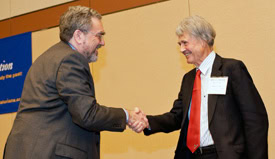
Michael Cook with Anthony Grafton
The Leland Prize is offered every five years for an outstanding reference tool in the field of history. Committee members are Philander D. Chase, University of Virginia, chair; Elizabeth Z. Bennett, Princeton University; Jonathan Dewald, University at Buffalo, SUNY; James M. Murray, Western Michigan University; and Mary Ann Quinn, Rockefeller Archive Center.
The New Cambridge History of Islam, six volumes (Cambridge University Press)
Michael Cook, Princeton University, general editor
The New Cambridge History of Islamis an extraordinary achievement. It gives serious attention to the full sweep of Islamic history, from the seventh century to the twenty-first, and to the wide array of places where Islam has mattered. Combining narrative, thematic analysis, and clear exposition of basic information, it addresses the needs of students, scholars, and the wider public. It does all this with subtlety, balance, and a concern to provide insight as well as information.
Littleton-Griswold Prize
Established in 1985, this prize is offered annually for the best book in any subject on the history of American law and society. Committee members are Sally Hadden, Western Michigan University, chair; Annette Gordon-Reed, New York Law School; Daniel W. Hamilton, University of Illinois at Urbana-Champaign; Karl Jacoby, Brown University; and David Stebenne, Ohio State University.
Pauline Maier, Massachusetts Institute of Technology
Ratification: The People Debate the Constitution, 1787–1788(Simon & Schuster)
The book is a masterfully organized, beautifully written, and exhaustively researched investigation of the Constitution’s ratification at the state level. It moves effortlessly between local details and national implications, crafting a compelling narrative. Maier’s book fills a major gap in our understanding of how the Constitution moved from a proposal to the nation’s highest law. Ratification joins the short list of history books about the U.S. Constitution that historians and general readers should know.
J. Russell Major Prize
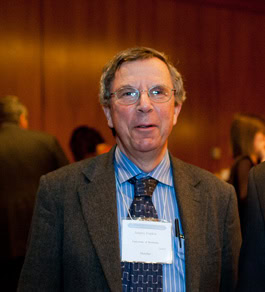
Jeremy D. Popkin
The Major Prize is an annual prize for the best work in English on any aspect of French history. It was established in memory of J. Russell Major, a distinguished scholar of French history who served on the history faculty at Emory University from 1949 until his retirement in 1990. Prize committee members are Patricia Lorcin, University of Minnesota-Twin Cities, chair; Katherine B. Crawford, Vanderbilt University; and Kenneth Mouré, University of Alberta.
Jeremy D. Popkin, University of Kentucky
You Are All Free: The Haitian Revolution and the Abolition of Slavery (Cambridge University Press)
Jeremy Popkin’sYou Are All Free is an original, densely researched book that redresses numerous misconceptions about the events leading to Haitian independence and the abolition of slavery. Placing colonial crisis in Cap Français in June 1793 at the center of his analysis, Popkin demonstrates that contingencies and unforeseen circumstances played critical roles in the French Revolution’s abolition of slavery. His book is beautifully written, well thought out, and a real page-turner.
Helen and Howard R. Marraro Prize in Italian History
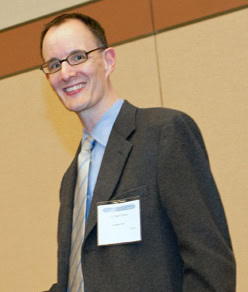
Michael R. Ebner
Established in 1973, the Marraro Prize is offered annually for the best work in any epoch of Italian history, Italian cultural history, or Italian-American relations. Prize committee members are Sharon Strocchia, Emory University, chair; Margaret King, Brooklyn College, CUNY; and Marla Stone, Occidental College.
Michael R. Ebner, Syracuse University
Ordinary Violence in Mussolini’s Italy (Cambridge University Press)
This superbly argued book revises how historians understand the workings of Fascist government. Challenging standard interpretations, it argues that political and social repression stood at the core of Fascism and defined the daily lives of all Italians. Everyday violence—from imprisonment to exile, from isolation to enforced impoverishment—characterized Fascism’s diffused culture of repression that exerted a particularly destructive impact on vulnerable groups such as the working class, political dissidents, homosexuals, and religious dissenters.
George L. Mosse Prize
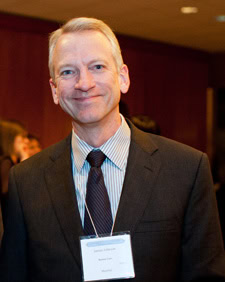
James H. Johnson
The Mosse Prize is awarded annually for an outstanding major work of extraordinary scholarly distinction, creativity, and originality in the intellectual and cultural history of Europe since the Renaissance. It was established with funds donated by former students, colleagues, and friends of Professor Mosse. Committee members are George Williamson, Florida State University, chair; Tracie Matysik, University of Texas at Austin; and Jonathan Sheehan, University of California, Berkeley.
James H. Johnson, Boston University
Venice Incognito: Masks in the Serene Republic (University of California Press)
In lively and learned prose, Johnson resurrects the strange and wondrous world of early modern Venice, whose citizens lived half their lives behind masks. The play of dissimulation was serious business indeed, he shows, as densely entwined with politics and hierarchy, as with pleasure and delight. This exemplary piece of scholarship weaves together cultural, social, and political histories, and leaves us with a brilliantly original picture of the serene republic.
James A. Rawley Prize in Atlantic History

James H. Sweet
The Rawley Prize was created in 1998 in accordance with the terms of a gift from James A. Rawley, Carl Adolph Happold Professor of History Emeritus at the University of Nebraska-Lincoln. It is offered annually to recognize outstanding historical writing that explores aspects of integration of Atlantic worlds before the twentieth century. Prize committee members are Marjoleine Kars, University of Maryland, Baltimore County, chair; Christine Daniels, Michigan State University; and Sarah Pearsall, Oxford Brookes University. This year the committee took the unusual step of recognizing two distinct yet complementary books, one image-based and the other a traditional monograph. Each epitomizes in its own way the best of Atlantic scholarship.
James H. Sweet, University of Wisconsin-Madison
Domingos Álvares, African Healing, and the Intellectual History of the Atlantic World (University of North Carolina Press)
Domingos Álvares, African Healing, and the Intellectual History of the Atlantic World provides a richly imaginative microhistory of one African enmeshed in the transatlantic slave trade. This study illuminates with extraordinary clarity and grace a life previously lost in obscurity, allowing us to see the Atlantic world anew. Sweet demonstrates brilliantly both the heartrending consequences of intercontinental integration and the intellectual ferment forged in the brutal crucible of the South Atlantic slave trade.
David Eltis, Emory University, and David Richardson, University of Hull
Atlas of the Transatlantic Slave Trade (Yale University Press)
Atlas of the Transatlantic Slave Trade contextualizes and interprets the wealth of data contained in the Trans-Atlantic Slave Trade Database through a dazzling visual panorama of highly detailed maps and charts. It presents a stark macrohistory of the devastating connections between outfitting ports in Europe and the Americas, regions of slave embarkation in Africa, and final destinations for captives in the New World. Scholars and students alike will be consulting this book for decades.
John F. Richards Prize in South Asian History
The John F. Richards Prize in South Asian History recognizes the most distinguished work of scholarship on South Asian history published in English during the previous calendar year. South Asia is defined as the geographic area included in the modern states of Afghanistan, Bangladesh, Bhutan, Burma, India, the Maldives, Nepal, Pakistan, and Sri Lanka. The prize covers any period or field of South Asian historical studies and works which integrate South Asian history with broader global issues and movements. In making its selection, the prize committee will pay particular attention to depth of research, methodological innovation, conceptual originality and literary excellence. Prize committee members are Mrinalini Sinha, Univ. of Michigan, chair; Durba Ghosh, Cornell University; and Kris Manjapra, Tufts University.
Farina Mir, University of Michigan
The Social Space of Language: Vernacular Culture in British Colonial Punjab (University of California Press)
This exquisitely wrought work of literary and cultural history provides a model for future studies of vernacular literary formations. Its deft reading of Hir-Ranjha texts is exemplary in its attention to their spaces of production and performance; their modes of reception; how their authority was constituted; and their changing meanings. Equally, the book successfully upends standard expectations about the link between colonial policy and vernacular formations and about the equation between language and religion.
Wesley-Logan Prize
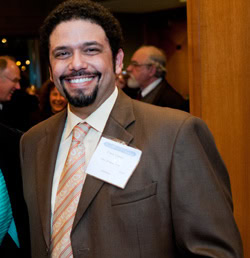
Frank Andre Guridy
The AHA and the Association for the Study of African American Life and History (ASALH) jointly sponsor the Wesley-Logan Prize in African Diaspora History. It is awarded annually for an outstanding book on some aspect of the history of the dispersion, settlement, adjustment, and/or return of groups originally from Africa. Prize committee members representing the AHA and the ASALH are Daryl Scott, Howard University, chair; Laura Rosanne Adderley, Tulane University; Alexander X. Byrd, Rice University; Annette Palmer, Morgan State University; and Tiffany R. Patterson, Vanderbilt University.
Frank Andre Guridy, University of Texas at Austin
Forging Diaspora: Afro-Cuban and African Americans in a World of Empire and Jim Crow (University of North Carolina Press)
Frank Guridy skillfully uses archival sources in both the United States and Cuba to explore the cultural, economic, and political relationships between Afro-Cubans and Afro-Americans from the 1890s to the 1950s. They sheltered themselves from the cruelty of imperialism and racism while negotiating the restrictions based on race in both societies. This book forces us to think deeply about the cross-diaspora linkages in the Americas in this era. This is a remarkable achievement.
AHA Award for Scholarly Distinction
In 1984 the Council of the American Historical Association established a new award entitled the American Historical Association Award for Scholarly Distinction. Each year a nominating jury—composed of the president, president-elect, and immediate past president—recommends to the Council of the Association up to three names for the award. Nominees are senior historians of the highest distinction in the historical profession who have spent the bulk of their professional careers in the United States. Previous awards have gone to Nettie Lee Benson, Woodrow Borah, Alfred D. Chandler Jr., Thomas D. Clark, David Brion Davis, Angie Debo, Martin Duberman, Helen G. Edmonds, Elizabeth L. Eisenstein, Saul Friedländer, Lloyd Gardner, Peter Gay, Felix Gilbert, Jack P. Greene, John Whitney Hall, Tulio Halperín-Donghi, Joseph E. Harris, John Higham, H. Stuart Hughes, Margaret Atwood Judson, Michael Kammen, Nikki R. Keddie, George F. Kennan, Paul Oskar Kristeller, Gerhart B. Ladner, Gerda Lerner, Lawrence W. Levine, Leon Litwack, Wallace T. MacCaffrey, Ramsay MacMullen, Ernest R. May, Arno J. Mayer, Richard P. McCormick, August Meier, Edmund Morgan, George L. Mosse, Susan Naquin, Robert O. Paxton, John G.A. Pocock, Earl Pomeroy, H. Leon Prather Sr., Benjamin Quarles, Edwin O. Reischauer, Robert V. Remini, Nicholas V. Riasanovsky, Caroline Robbins, Arthur M. Schlesinger Jr., Carl E. Schorske, Benjamin I. Schwartz, Anne Firor Scott, Joan Wallach Scott, Kenneth M. Setton, Nancy G. Siraisi, Kenneth M. Stampp, Peter Stansky, Chester G. Starr, Barbara and Stanley Stein, Fritz Stern, Lawrence Stone, Sylvia L. Thrupp Strayer, Merze Tate, Emma Lou Thornbrough, Brian Tierney, David Underdown, Eugen Weber, Gerhard Weinberg, and George R. Woolfolk.
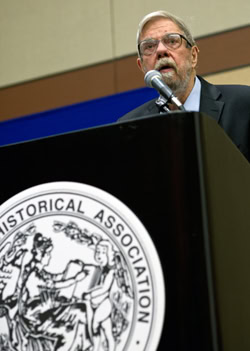
Donald R. Kelley
The president-elect will introduce this year’s honoree, Donald R. Kelley, Rutgers University–New Brunswick, emeritus.
Educated at Harvard, where he was taught by Myron Gilmore, and trained at Columbia, where he studied with Garrett Mattingly, Donald Kelley started out in the 1960s as a specialist in the French jurists and historians who transformed historical and political thought in the second half of the sixteenth century. Foundations of Modern Historical Scholarship (Columbia University Press, 1970), his first book, is a richly researched and eloquent study that deals—unusually for the time—more with the practices of early modern scholars than with the claims made in their prefaces. The style of research that Kelley established here, which combined trawling for archival documents with close reading of texts and set the thinkers into richly recreated political and institutional contexts, was partly inspired by contemporary work in the history of science. The book set a new standard for its field and remains, two generations later, a standard work, still regularly read and used.
The French jurists of the Renaissance continued to interest Kelley, and over the years he devoted a major biography to the most radical of them, François Hotman, and pursued their work and thought in substantial articles. More remarkable, he soon began to roam across borders, both geographical and chronological. A major interpretative essay, The Beginning of Ideology (1981), explored the polarization of religious and political beliefs in sixteenth-century France; a second, The Human Measure (1990), offered a pioneering survey of the visions of society articulated by western jurists from ancient Rome to modern times. Kelley also devoted revisionist studies to the English common lawyers of the Renaissance and to the legal historians of post-revolutionary France, and, working with Jack Hexter and Bonnie Smith, produced important editions of works by Claude de Seyssel and Pierre Proud’hon.
A proud, but self-critical, practitioner of intellectual history, a form of history that seemed to be falling out of fashion in the 1980s and after, Kelley made massive and effective efforts to sustain it. As editor of the Journal of the History of Ideas for many years, he transformed a solid but somewhat backward-looking periodical, attracting work of many kinds and providing a platform for some important debates about methodology. His experience clearly helped to inspire one of his most original studies, The Descent of Ideas: The History of Intellectual History (2002), the first serious effort to trace the roots of intellectual history as a practice in multiple earlier forms of enquiry and, more important still, to show its connections to philosophical eclecticism. In the same years, he organized a number of important summer courses, symposia, and conferences, which brought together intellectual historians from around the world and, in some cases, yielded important collaborative volumes.
A series of massive volumes published by Yale University Press between 1991 and 2006 summed up some of the lessons of Kelley’s career, tracing the development of history from antiquity to the present and providing excerpts from a vast range of texts for use by students. One reviewer’s appreciation of the second volume gives a good sense of the accomplishment of this series as a whole: “a dazzlingly erudite book informed by a breath-taking perspective. It represents the fruit of a lifetime of painstaking scholarship and mature reflection. Kelley cites Fustel de Coulanges’s adage that ‘one day of synthesis takes years of analysis’ (pp. 210, 318), and one senses that this project reflects the truth of the dictum. Precisely because he is so familiar with the nooks and crannies of the vast terrain he covers here, Kelley can give us panoramic vistas that allow us to see the movement of the landscape as a whole, including continuous and recurrent features in the land. He also knows when to zoom down to particulars and, in doing so, provides expert orientation to key actors, movements, and intellectual battle zones. While Kelley is thoroughly conversant with the relevant secondary literature, his analyses are invariably grounded in primary texts (I noted sources in seven languages). He possesses, moreover, a marvelous gift for compressing a vast amount of information into fluent and elegant prose.” Kelley showed in these volumes how much he had learned from the more literary approaches widely adopted by historians in the 1990s and after.
Throughout a long career, Donald Kelley has set and met the highest standards of scholarship. A passionate reader and at times a dazzlingly eloquent writer, a scholar who has never ceased working his way into new sources and mastering new works of scholarship, he is one of the master craftsmen of American historiography.
The Troyer Steele Anderson Prize
At its December 27, 1963, meeting, the AHA Council established this prize endowed by a bequest from Frank Maloy Anderson, a longtime AHA member. The prize was to be awarded every ten years beginning in 1970 to the person whom the Council of the Association considered to have made an outstanding contribution to the advancement of the purposes of the Association during the preceding ten years. In 1990, the Council and the Professional Division reviewed the history of the prize and approved several recommendations, including awarding the prize at least every five years to recognize service to the profession. More recently, the Professional Division agreed to award the prize on a regular basis to honor AHA members’ contributions to the Association.
Previous awards have gone to Albert J. Beveridge III, the Association’s legal counsel; Joseph Harris, founding chair of the AHA’s Committee on Minority Historians; Arnita A. Jones, executive director emerita of the American Historical Association; Stanley N. Katz, Princeton University, former vice president of the AHA’s Research Division; Page Putnam Miller, longtime director of the National Coordinating Committee for the Promotion of History; Anna Kasten Nelson, American University, for her tireless efforts on behalf of public history; Willie Lee Rose, primary author of the 1970 Report of the AHA Ad Hoc Committee on the Status of Women; Roy Rosenzweig, George Mason University, former vice president of the AHA’s Research Division; Boyd Shafer, former AHA executive secretary and managing editor of the American Historical Review; and David Trask, longtime advocate for new ties with historians teaching at two-year colleges.
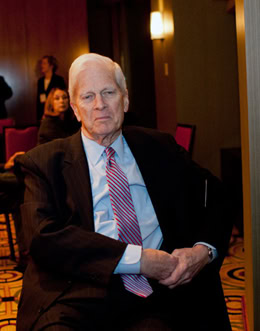
James Billington
The eleventh honoree is James Billington, Librarian of Congress. Dr. Billington has served twenty-four years as Librarian. In this position he has facilitated the continuation of the joint AHA-Library of Congress J. Franklin Jameson Fellowship, the most prestigious of the AHA’s fellowships. During his tenure, and through his cooperation, the Library housed the AHA’s J. Franklin Jameson Papers Project, which produced a three-volume documentary edition of Jameson’s public and private papers. Over the years, Dr. Billington has met frequently with AHA executive directors, presidents, and Council members to discuss areas of mutual concern, such as increasing the efficiency of the Library and keeping it accessible despite cuts in the Library’s federal appropriations and its increased security challenges.
Perhaps most significantly, Dr. Billington spearheaded creation of a National Digital Library to provide electronically the Library of Congress’ vast card catalog, its photographic collections, the documents comprising the “first century of lawmaking,” and a number of significant manuscript collections, for the use of historians everywhere in the nation and the world. It is no exaggeration to say that because of these efforts, the world’s largest library is now more readily available to scholars than at any time in its more than two centuries of operations.
The relationship between the American Historical Association and the Library of Congress is one of considerable value to all historians. AHA members have benefitted abundantly from James Billington’s leadership of the Library and it is entirely fitting to recognize his contributions through the Troyer Steele Anderson Prize.
Eugene Asher Distinguished Teaching Award
Established in 1986, the Eugene Asher Distinguished Teaching Award recognizes outstanding teaching and advocacy for history teaching at two-year, four-year, and graduate colleges and universities. The award is named for the late Eugene Asher, for many years a leading advocate for history teaching. The Society for History Education shares with the AHA sponsorship of the award. The award recognizes inspiring teachers whose techniques and mastery of subject matter made a lasting and substantial difference to students of history. Members of the Committee on Teaching Prizes are Holly Brewer, North Carolina State University, chair; Paul G.E. Clemens, Rutgers University-New Brunswick; William Everdell, St. Ann’s School; Stuart D. Graybill, Sacramento City College; and Troy Johnson, California State University at Long Beach.
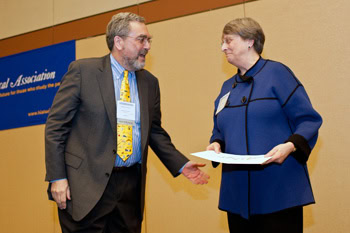
Kathleen Neils Conzen with Anthony Grafton
The 2011 honoree is Kathleen Neils Conzen, who served for more than thirty-five years as a professor of history at the University of Chicago, where she taught many thousands of undergraduates and hundreds of graduate students to teach and to research. She served on over a hundred dissertation committees. What leaps out from the nomination letters of her former students is the strength of their devotion to her teaching and model of inquiry. “She was and remains my model.” She had a “quality of mind that focuses on large, analytical questions—she always focused on the larger picture and pressed me to think outward rather than inward … . These are the kinds of qualities that lead students to tackle big questions, to finish dissertations and books.”
“Kathy taught—and insisted on—sophistication about the dual movement of history and historiography through time. … But the key thing to understand about Kathy’s teaching, in lecture courses, seminars, and office meetings, is that her light touch gave you the illusion that nothing extraordinary was going on. … Her specialty was letting the students talk and then quietly, almost hesitantly, asking a deceptively simple question that suddenly made you feel brilliant—not because you knew the answer (as she knew you would), but because that question and answer, together, opened new worlds of connections. … [T]he key was a kind of understated production of intellectual thrill, in which you saw your triumph immediately and only spotted Kathy’s choreography of the moment much later.”
Her “light touch” and her ability to get her graduate students (and indeed her undergraduates as well) to ask the larger questions from multiple angles are consistent themes in her letters of support. One wrote: “I worked as a teaching assistant for Kathy in two undergraduate courses, and thus had the benefit of observing her in literally scores of class sessions. As was the case with her graduate advising, the great strength of her college teaching was in allowing the students to make their own way through the material.” “Most of all, she asked questions—questions that opened up entire avenues of inquiry … . I now realize that what Professor Conzen was teaching me all those years, and what she has taught so many others, was how to make a significant historical argument. That, it turns out, is a very difficult thing to teach.”
In pursuit of these larger questions she encouraged “engagement with people beyond the university” that meant that her students work often had a deep and broad impact beyond the academy. Most of all, she shaped multiple generations of historians and scholars. As one noted introspectively, “All the things she said and did, and the values she inculcated in me, have shaped my thirty year career as an historian.”
Beveridge Family Teaching Prize
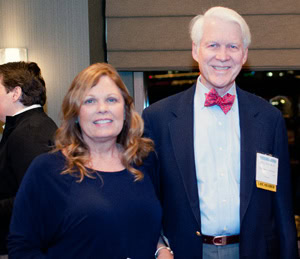
Marney Murphy with Albert J. Beveridge III
Established in 1995, this prize honors the Beveridge family’s longstanding commitment to the AHA and to K–12 teaching. Friends and family members endowed this award to recognize excellence and innovation in elementary, middle, and secondary school history teaching, including career contributions and specific initiatives. The honoree can be recognized either for individual excellence in teaching or for an innovative initiative applicable to the entire field. The prize is awarded by rotation: to an individual and to a group. The prize was first offered in 1996, and in 2011 it is awarded to an individual teacher, with the selection committee honoring two teachers. Members of the Committee on Teaching Prizes are Holly Brewer, North Carolina State University, chair; Paul G.E. Clemens, Rutgers University-New Brunswick; William Everdell, St. Ann’s School; Stuart D. Graybill, Sacramento City College; and Troy Johnson, California State University at Long Beach.
The Beveridge Family Teaching Prize for K–12 teachers goes to two dedicated and inspiring teachers. Marney Murphy has been in education for thirty-six years and is currently a library media specialist at Three Rivers Middle School in Cleves, Ohio. In 1985 she first hosted a naturalization ceremony at the school, and since that first ceremony more than 5,000 students at the school have had the opportunity to witness the naturalization of more than 500 citizens from countries from around the world. Recognizing that her own school had a very homogeneous student population, she realized that having students think about diversity at an early age was critical to overcoming prejudice. Her approach has become a model for other school districts.
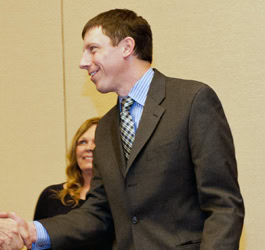
Jason E. Yaman
Jason E. Yaman has taught history and geography at the Blythewood Middle School in South Carolina since 2002. The school draws students from both rural and suburban backgrounds, and the students he teaches typically differ significantly in cognitive ability, maturity, socioeconomic status, and motivation. Believing that it is his responsibility to engage students from all backgrounds in learning, Mr. Yaman has developed an innovative learning strategy based on story boards. The boards graphically guide students through written texts, using their ability to visualize the past to aid them in mastering history content. He has contributed to national discussions among middle school teachers about pedagogy and helped his school receive a School to Watch award.
Raymond J. Cunningham Prize for the Best Article by an Undergraduate
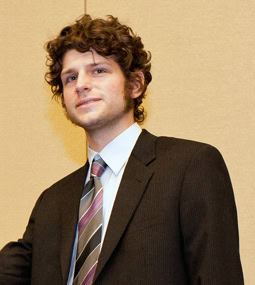
Daniel Williford
First awarded in 2010, the Cunningham Prize honors the best article written by an undergraduate student published in a history department journal. This annual prize was established in memory of Raymond J. Cunningham, who was an associate professor of history at Fordham University and an authority on American historian, Herbert Baxter Adams. Each history department journal may nominate one article, and the winning author and the winning journal each receive a cash prize. Prize committee members are Cora Granata, California State University, Fullerton, chair; William Benedicks Jr., Tallahassee Community College; Francis G. Couvares, Amherst College; Susannah Ottaway, Carleton College; and Timothy L. Schroer, University of West Georgia.
The second honoree is Daniel Williford, Rhodes College, for “Visions of Pre-Islamic Algeria in the Revue Africaine, 1870–1896,” Rhodes Historical Review 13 (spring 2011): 45–69.
Williford’s close reading of the French academic journal La Revue Africaine lucidly demonstrates that the French colonial regime constructed a narrative that transformed the physical and historical space of Algeria in academic discourse by representing Arab Muslims as “usurpers in what had once been a Berber, Phoenician, and Roman land.” The sophistication of the writing and the research are well beyond the expectations of an undergraduate. He is to be congratulated for his exemplary work.
Equity Awards
In 1996, the American Historical Association adopted a statement on equity that acknowledges its commitment “to diversity in the historical profession” and called on “institutions to recruit aggressively and hire members from groups that have been historically discriminated against.”
To further these goals, the AHA has established two equity awards to be conferred annually: one for individuals and another for academic units. The awards are meant to recognize and publicize individuals and institutions that have achieved excellence in recruiting and retaining under-represented racial and ethnic groups into the historic profession, and can recognize new initiatives or sustained efforts.
Those eligible for the individual award are historians who have demonstrated an exceptional record in the recruitment and retention of students and new faculty from racial and ethnic groups under-represented within the historical profession. Their record might include such achievements as mentoring, program building, fundraising initiatives, pursuing civic engagement, and enhancing department culture to promote a supportive environment.
Eligible for the institutional award are such academic units as, for example, departments of history, public history programs, and interdisciplinary programs and research institutes. Eligible units within colleges and universities will have demonstrated an exceptional record in the recruitment and retention of students and new faculty from racial and ethnic groups underrepresented within the historical profession. Such units may have taken advantage of university and community resources to diversify their students and faculty or to provide professional experience through teaching, research, post doctoral, or internship programs.
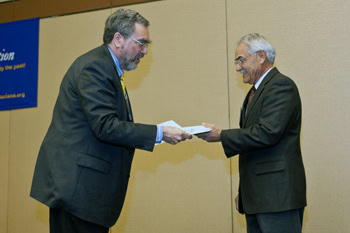
Andrés Tijerina with Anthony Grafton
The AHA’s Committee on Minority Historians serves as the prize committee. Members are Martin Summers, Boston College, chair; Douglas Kiel, University of Wisconsin-Madison; Shaun T. Lopez, University of Washington, Seattle; Mae Ngai, Columbia University; and Celia E. Naylor, Dartmouth College.
Individual Equity Award: Andrés Tijerina, Austin Community College
Since his days as a graduate student at the University of Texas at Austin in the mid-1970s, Andrés Tijerina has demonstrated a commitment to promoting the study of the history of underrepresented groups in the Southwest. As a professor of history and mentor to Tejano students at Austin Community College, a general series editor for Texas A&M University Press, and a Texas State Historical Association Fellow, Tijerina has worked diligently to enhance diversity within the historical profession.
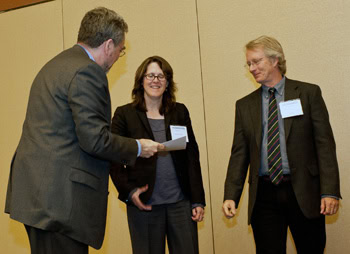
Martha Few and Kevin Gosner of the University of Arizona’s history department, with Anthony Grafton.
Institutional Award: History Department at the University of Arizona
The University of Arizona Department of History received the Institutional Award. This department has fostered an environment of diversity and inclusion and possesses an impressive record of achievement in the recruitment, retention, graduation, and tenure-track placement of individuals from racial and ethnic groups underrepresented within the historical profession. Many of its graduates have been first-generation college students, and this department has also been a leading feeder program for minority students entering PhD programs nationwide.
Herbert Feis Award for Distinguished Contributions to Public History
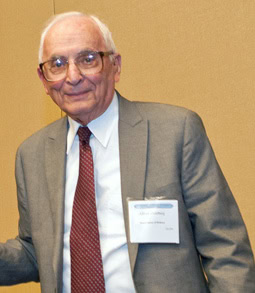
Alfred Goldberg
Established in 1984, this prize is offered annually to recognize distinguished contributions to public history during the previous ten years. The prize is named in memory of Herbert Feis (1893–1972), public servant and historian of recent American foreign policy, with an initial endowment from the Rockefeller Foundation. The prize was originally given for books produced by historians working outside of academe. From 2006, the scope of the award is widened to include other types of public history work.
The terms of the award now define both “contribution” and “public history” broadly. Contributions could, for example, include work as the administrator of a public history group or agency (such as a historical society, a historic site, or a community history project) or as the creator or producer of a public history product or products (such as a museum exhibit, radio script, website, oral history collection, or film).
Often, the contribution will be the result of years of effort in the field, but the prize can also recognize a singular contribution of major importance such as a pathbreaking museum exhibit. Public history is defined as work primarily directed at non-academic, non-school-based audiences. Those audiences could be very broad (e.g., television viewers) or highly specialized (e.g., policymakers). Although the audience is primarily outside of academia, the recipient of the award can be employed at a university.
Prize committee members are Robert P. Forbes, University of Connecticut, chair; Richard H. Kohn, University of North Carolina at Chapel Hill; Clement Price, Rutgers University-Newark; Linda Shopes, Pennsylvania Historical Museum Commission, retired; and Susan Strasser, University of Delaware.
The 2011 Feis Award is awarded to Alfred Goldberg, former director of the Historical Office of the Office of the Secretary of Defense. Alfred Goldberg, a pioneer of modern public history, has chronicled U.S. military history for nearly seven decades, as one of the first historians for the Air Force and the Department of Defense. Goldberg has been an inspiring force in public history: a meticulous author and exacting editor, a probing interviewer of policy makers, and a tireless advocate of declassifying government records. Few figures have done so much to document and make accessible our recent history.
William Gilbert Award for the Best Article on Teaching History
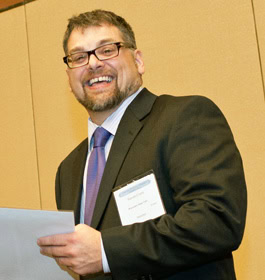
Steven H. Corey
Named in memory of William Gilbert, a longtime AHA member and distinguished scholar-teacher at the University of Kansas, this biennial award recognizes outstanding contributions to the teaching of history through the publication of journal and serial articles. Eligible for consideration are articles written by members of the AHA and published in the United States during the previous two years. Journals, magazines, and other serials that publish works on the teaching of history, including methodology and theory of pedagogy, are also eligible to submit nominations. Members of the Committee on Teaching Prizes are Holly Brewer, North Carolina State University, chair; Paul G.E. Clemens, Rutgers University-New Brunswick; William Everdell, St. Ann’s School; Stuart D. Graybill, Sacramento City College; and Troy Johnson, California State University at Long Beach.
The winner of the 2011 Gilbert Award is Steven H. Corey, Worcester State College, “Pedagogy and Place: Merging Urban and Environmental History with Active Learning,” Journal of Urban History 36, no. 1 (January 2010): 28–41.
Drawing on John Dewey’s concept of the educational value of learning through personal experience, Steven Corey explains how he attempts to integrate “active learning” exercises into his courses on American urban and environmental history in Worcester, Massachusetts. In this article, he makes a strong case for infusing “the undergraduate curriculum with exercises that allow students and faculty to learn collaboratively from local sources.” To that end, Corey traces his efforts to provide students of his courses with a variety of local experiences that “can be used to illustrate larger urban trends and environmental themes while at the same time exciting students about becoming scholars, public policy professionals, and informed citizens.”
Corey concludes that active learning exercises help students learn to “appreciate the fact that they become partners in their educational process” and that in his experience they frequently “respond by producing higher quality written work and more engaged class discussion than in … courses that lack active learning components.”
While Corey is careful to avoid over-selling “active learning,” he makes a strong, persuasive case that it can help students learn problem-solving and critical, analytical skills that are sometimes more difficult to impart in conventional academic settings.
John E. O’Connor Film Award
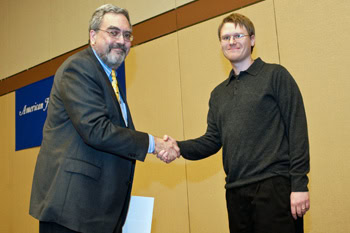
Chad Freidrichs, director of The Pruitt-Igoe Myth: An Urban History, with Anthony Grafton.
In recognition of his exceptional role as a pioneer in both teaching and research regarding film and history, the American Historical Association has established this award in honor of John E. O’Connor, New Jersey Institute of Technology and Rutgers University at Newark. The award seeks to recognize outstanding interpretations of history through the medium of film or video. Essential elements are stimulation of thought, imaginative use of the media, effective presentation of information and ideas, sensitivity to modern scholarship, and accuracy. The production should encourage viewers to ask questions about historical interpretations as well as make a contribution to the understanding of history. Members of the award committee are Ron Briley, Sandia Preparatory School, Albuquerque, chair; Suzanne Langlois, Glendon College, York University; and Nina Mjagkij, Ball State University.
The recipient of the seventeenth O’Connor Film Award is The Pruitt-Igoe Myth: An Urban History, directed by Chad Freidrichs and produced by Chad Freidrichs, Jaime Freidrichs, Paul Fehler, and Brian Woodman; Unicorn Stencil Documentary Films.
This film depicts the failure of a public housing complex in post-World War II St. Louis. Old 16mm films are brought back to life and relevance as the images accompany a sensitive use of witnesses. Selective scholarly inputs draw the larger picture. The flow of dark film segments creates a film noir ambiance; its soundscape is disquietingly powerful. This film achieves a vivid historical exploration of the social and economic issues faced by modern urban societies.
Nancy Lyman Roelker Mentorship Award
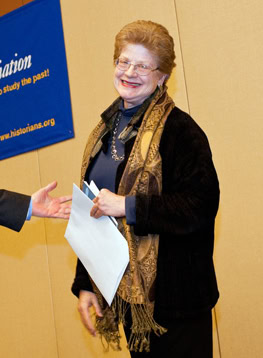
Elizabeth Blackmar
In recognition of her exceptional role as a teacher, scholar, and committed member of the historical profession, and on the occasion of her seventy-fifth birthday, friends, colleagues, and former students established the Nancy Lyman Roelker Mentorship Award to recognize and encourage mentoring in the historical profession. The special quality of mentorship is the human quality in teaching, revealed in commitment to the value of the study of history and the love of teaching it to students, regardless of age or career goals. It carries with it a personal commitment by the mentor to the student as a person. The award is operated on a three-year cycle: graduate, undergraduate, and precollegiate. The 2011 honor is awarded to an undergraduate mentor. Members of the award committee are Caroline Cox, University of the Pacific, chair; Deborah Gray-White, Rutgers University-New Brunswick; Carol Lasser, Oberlin College; David C. Penn, Crane Technical High School; and Darlene Spitzer-Antezana, Prince George’s Community College, Maryland.
The committee is pleased to recognize Elizabeth Blackmar, Columbia University, with the 2011 Roelker Mentorship Award. The committee had the rewarding but difficult task of selecting an honoree from a large and strong pool of candidates. Many of the faculty nominated demonstrated similar qualities: they shared a love of teaching, a personal commitment to their students, and a willingness to devote an enormous amount of time and energy to advising and mentoring, counseling students about academic life and so much more.
The committee felt that all of these qualities were exemplified by Dr. Blackmar. Additionally she has developed mentoring relationships that have endured. The committee was especially moved by the long duration and flexible nature of some of these relationships. As former advisees became mature adults, perhaps graduate students or other professionals, they became friends, sometimes colleagues, and always equals. And indeed over the years her students became people that the advisor herself could turn to for advice. We were impressed by this dynamism and felt that the ability to grow and change with the relationship was an essential ingredient for the longevity of these connections. And from the evidence submitted in the supporting letters, it was clear that Dr. Blackmar set this tone of friendship, openness, and trust from the very beginning of the relationship. Even when students were being firmly guided and directed, she was able to do it in a way that never felt intrusive to them. And that ability to approach her advising, based on empathy and openness, laid the foundation not only for effective and enduring mentoring but for lifelong connections.
Roy Rosenzweig Prize for Innovation in Digital History
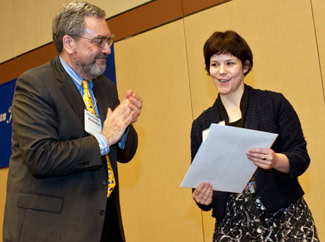
Rebecca Federman, project curator of the New York Public Library’s “What’s On The Menu?”; with Anthony Grafton.
The Rosenzweig Prize is sponsored jointly by the AHA and the Roy Rosenzweig Center for History and New Media at George Mason University. It was developed by friends and colleagues of Roy Rosenzweig (1950–2007), the Mark and Barbara Fried Professor of History and New Media at George Mason University, to honor his life and work as a pioneer in the field of digital history. The prize will be awarded annually to honor and support work on an innovative and freely available new media project, and in particular for work that reflects thoughtful, critical, and rigorous engagement with technology and the practice of history. Committee members representing the AHA and George Mason University are Daniel Cohen, George Mason University, chair; Stephen Brier, Graduate Center, City University of New York; Michael J. Galgano, James Madison University; Kathleen W. Jones, Virginia Tech; and Michael O’Malley, George Mason University.
New York Public Library, “What’s on the Menu?”
This digital archive of unusual primary sources—nearly 40,000 menus dating from the 1840s to the present—would be interesting on its own. But the New York Public Library has generated a clever and effective mode of crowdsourcing that engaged thousands of people and led to an even more remarkable resource for historians, in which over a half-million dishes were transcribed, giving a new sense of what people ate, drank, and even occasionally sang during their meals.
Honorary Foreign Member
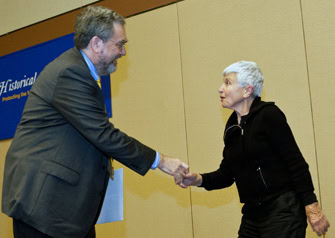
Mechal Sobel with Anthony Grafton
At its second annual meeting in Saratoga in 1885, the newly appointed Committee on Nominations for Honorary Membership adopted a resolution that appointed Leopold von Ranke as the first honorary foreign member of the Association. In the intervening 115 years, only 93 individuals have been so honored. Commencing in 1991, one annual selection is made honoring a foreign scholar who is distinguished in his or her field of history and who has notably aided the work of American historians. Currently, the AHA has eleven living honorary foreign members representing eight countries.
The 2011 Honorary Foreign Membership is awarded to Mechal Sobel, University of Haifa. Dr. Sobel is one of the most imaginative historians at work today. An American by birth, she has lived in Israel for most of her adult life, and conducted her entire academic career at the University of Haifa. Each of her four major books addresses the meaning of racial identity, the understandings of self and other, and the social construction of race relations in the United States; they have, as one reviewer observed, “altered profoundly the way in which … American history is understood.” Throughout her work, Sobel proposes that the key to historical change—from to early past to our own time—lies in the ability of people to change “their relationship to the Other, by incorporating the Other into their dreams and into their lives.” One reviewer observed of one of her books, “Some histories do not take the obvious at face value, thereby making the obvious into something new and provocative.” The same could be said of the body of her work.
Editor’s Note: All of the photos in the article are by Marc Monaghan.
View the complete video of the Awards and Prizes ceremony on the AHA’s You Tube channel.
* David Ciarlo’s name was misspelled in both the General Meeting booklet and the print version of the February issue of Perspectives on History; we regret the error.



